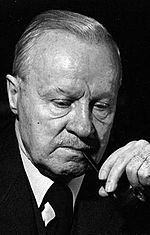Väinö Tanner, Date of Birth, Place of Birth, Date of Death
TweetVäinö Tanner
Finnish politician, Prime Minister of FinlandAbout Väinö Tanner
- Väinö Tanner (12 March 1881 – 19 April 1966; surname until 1895 Thomasson) was a leading figure in the Social Democratic Party of Finland, and a pioneer and leader in the cooperative movement in Finland.
- He was Prime Minister of Finland in 1926–1927.Tanner was born in Helsinki.
- He did not participate in the Finnish Civil War, maintaining a neutral attitude.
- When the war ended he became Finland's leading Social Democratic Party (SDP) politician, and a strong proponent of the parliamentary system.
- His main achievement was the rehabilitation of the SDP after the Civil War.
- Väinö Tanner served as Prime Minister (1926–1927), Minister of Finance (1937–1939), Minister of Foreign Affairs (1939–1940), and after the Winter War Minister of Trade and Industry (1941–1942) and Minister of Finance (1942-1944).Väinö Tanner's legacy is in his directing the Finnish working class from their extremist ideology towards pragmatic progress through the democratic process.
- Under his leadership the Social Democrats were trusted to form a minority government already less than 10 years after the bloody civil war.
- Tanner's minority socialist government passed a series of important social reforms during its time in office, which included a liberal amnesty law, reduced duties on imported foods, and pension and health insurance laws.During President Relander's brief illness Tanner, who held the post of prime minister, was even the acting President and Commander-In-Chief.
- In this role he even received the parade of the White guards on the 10th anniversary of the White victory.
- This was perceived as a remarkable development at the time.
- During the 1930s and 1940s, the Social Democrats formed several coalition governments with the Agrarian party.
- In the Winter War Väinö Tanner was the foreign minister.
- Väinö Tanner's leadership was very important in forming the grounds and creating the Spirit of the Winter War which united the nation. After the end of the Continuation War, Tanner was tried for responsibility for the war in February 1946, and sentenced to five years and six months in prison.After the Continuation War, and while still in prison, Tanner became the virtual leader of a faction of the SDP which had strong support from the USA.
- This faction eventually came out on top after a great deal of internal party strife lasting for much of the 1940s.
Read more at Wikipedia
See Also
- Famous People's Birthdays on 12 March, Finland
- Famous People's Birthdays in March, Finland
- Famous lawyer's Birthdays on 12 March, Finland
- Famous lawyer's Birthdays in March, Finland
- Famous politician's Birthdays on 12 March, Finland
- Famous politician's Birthdays in March, Finland
- Famous diplomat's Birthdays on 12 March, Finland
- Famous diplomat's Birthdays in March, Finland
- Famous journalist's Birthdays on 12 March, Finland
- Famous journalist's Birthdays in March, Finland


 Date of Birth:
Date of Birth:  Place of Birth: Helsinki, Uusimaa, Finland
Place of Birth: Helsinki, Uusimaa, Finland